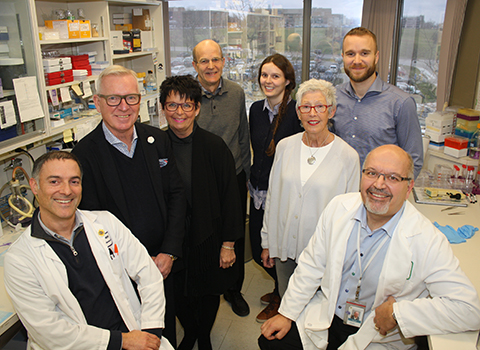
A small group of generous individuals donated $200,000 towards cutting-edge technology that’s significantly improved the capabilities of the Translational Ovarian Cancer Research Team at London Health Sciences Centre.
The IncuCyte Zoom is able to analyze the growth of dozens of patient cancer cells, outputting the data to create an accurate and real-time visual of tumour cell growth, while simultaneously allowing for an environment to test and monitor different treatments on cells. Dr. Trevor Shepherd, Senior Oncology Scientist at London Regional Cancer Program (LRCP) put forth the need for such a precise and efficient piece of equipment last year at a London Run For Ovarian Cancer event and quickly found a lead donor in Gary Pooley and his family.
“We lost a wonderful mother and wife to ovarian cancer,” said Gary. “The Translational Ovarian Cancer Research team is doing leading-edge research that we believe will lead to a breakthrough in the battle against this insidious disease. We contributed to the purchase of the IncuCyte System to support the team and the invaluable work they do.”
The Translational Ovarian Cancer Research Team’s goal is to improve the clinical outcome of patients with ovarian cancer. Because of a lack of reliable early detection methods and poor therapeutic management, ovarian cancer causes more deaths than any other cancer of the female reproductive system—a statistic this new technology and research has the potential to change.
The Pooley family saw first-hand how crucial the need was, and was joined by the following donors who contributed the rest of the funds needed to purchase this innovative piece of equipment: Peter and Trudy Channer, Sheila Fletcher, Robert Freeland, George Monckton and Dr. Gabriel DiMattia, Senior Oncology Scientist at LRCP.
Since its purchase in October, the technology has saved the team months of time and hundreds of dollars in meticulous research by performing complex analyses of cancer cells in just days. More importantly, it allows the team to apply its research directly to patient care in real time.
“This equipment has transformed the way we work,” said Dr. DiMattia. “It’s brought so much more capacity to what we do every day, allowing us to acquire more data and faster.”
It’s these types of cutting-edge technologies, supported entirely by donor support, that’s putting LRCP at the forefront of cancer research.
“A high-quality instrument like this seemed to be an unattainable dream item. The dream is now our reality,” -Dr. Trevor Shepherd
